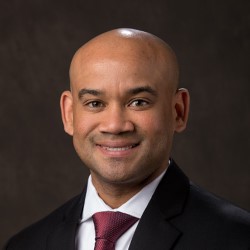Sunday Sessions IV | April 14 | 3:10 PM – 4:00 PM
< Back to Schedule
Sunday Session 4A: Think Bold: Funding Modernization with Infrastructure-as-a-Service (IaaS) | 1 CPE Credit
Description
The Infrastructure-as-a-service (IaaS) delivery model continues to grow in popularity as an alternative to both traditional delivery and traditional funding of capital infrastructure projects. But everyone you meet with talks about as-a-service differently. This breakout is a primer designed to identify and clarify the nuances and best use cases for traditional P3s, energy-as-a-service, and now infrastructure-as-a-service. Alternative financing considerations, M&O risk reallocation to a private sector partner, guaranteed operating conditions and outcomes, all these things can and should be considered when evaluating how to leverage infrastructure-as-a-service to achieve your vision for campus infrastructure modernization. Capital funding, risk reallocation, long-term M&O, let’s discuss the new tool in the toolbox.
Learning Objectives
- Achieve a clearer understanding of the use-case and transactional structure of a typical “as-a-service” transaction.
- Achieve a clearer understanding of the defining nuances of traditional P3, vs Energy-as-a-Service, vs Infrastructure-as-a-Service.
- Depart the session with an empowered understanding of how to utilize infrastructure-as-a-service to develop and fund campus infrastructure projects.
Speakers
 Alex Ray, Principal & National Practice Lead – Education, Viridis Initiative Alex Ray, Principal & National Practice Lead – Education, Viridis Initiative
Alex Ray (MBA, CBEP) has more than 13 years of experience developing, funding, and implementing strategic infrastructure solutions for his clients in Higher Ed, K12, and State/local government sectors across the Southeastern U.S. He has directed his clients to best-in-class outcomes in both traditional and alternatively delivered capital infrastructure modernization, deferred maintenance funding, central energy systems, plant operations optimization, energy efficiency, performance contracting, and utility-scale renewables infrastructure. His alternative delivery and funding portfolio alone represents more than $100M in infrastructure upgrades and modernization, securing more than $250M in projected plant M&O cost savings for his clients and the sequestration of more than 1.2M metric tons of CO2 from America’s water and air. Alex’s proudest achievements are his marriage to his wife Lindsey and their two beautiful yet rambunctious daughters, Olivia (5) and Annalise (3), all of whom call Little Rock, Arkansas home.
Chris Smith, Director of Project Design, Viridis Initiative
Chris Smith (PMP) has lead engineering, development, and operations teams in the energy and sustainability space for nearly 18 years. He focuses his teams’ efforts on creating outcome-based solutions for their clients, solving challenging infrastructure issues across a broad array of sectors and geographic locations. He began his career in field engineering and site management and has personally been responsible for overseeing north of $150M in deep energy retrofit work in the Southeast, primarily for K12, Higher Ed, and State/local government clients. He particularly enjoys navigating complex and challenging projects that require layered execution plans, occupied facility construction, and implementing centralized energy systems. Chris and his wife live in Richmond, Virginia with their three children, ages 8, 4, and 2.
< Back to Schedule
Sunday Session 4B: Western Kentucky University Achieves Financial Transformation and Strategic Cohesion | 1 CPE Credit
Description
Despite pervasive challenges in higher education, Western Kentucky University (WKU) has significantly transformed its financial planning processes, ensuring robust financial health for the future. This evolution has resulted in enhanced data transparency, fostered compelling dialogues between Deans and the Administration, and has been critical in forging a unified strategic approach across WKU. In this presentation, attendees will gain insights into WKU's transition to a Responsibility Center Management (RCM) budget model, the methodologies employed by the finance team in tuition revenue analysis and fee structuring, and the establishment of forward-looking financial plans. Presenters will share their processes and lessons learned along the way, as well as how these changes have enabled them to make timely, data-driven decisions institution-wide to drive strong financial performance.
Learning Objectives
- Understand best practices for implementing a responsibility center management (RCM) budget model.
- Discover proven methodology for accurate tuition revenue planning and forecasting.
- Learn how to leverage technology to integrate data and foster data-driven decisions.
Speakers
 Renaldo Domoney, Assistant Vice President for Budget, Finance and Analytics, Western Kentucky University Renaldo Domoney, Assistant Vice President for Budget, Finance and Analytics, Western Kentucky University
Renaldo serves as Assistant Vice President for Budget, Finance and Analytics at Western Kentucky University and oversees all financial functions including accounting & financial reporting, budget & financial planning, debt management, student accounts, and treasury & investment management. He played a pivotal role in guiding WKU through a transformative shift from an incremental budget to an incentive-based, RCM budget model. Simultaneously, he led the implementation of a campus-wide budget management software, which served as a significant upgrade to WKU's budgeting process. Renaldo earned both his MBA and bachelor’s degree in finance from Murray State University.
 Disha Venkatesan, Regional Sales Executive, Syntellis Performance Solutions Disha Venkatesan, Regional Sales Executive, Syntellis Performance Solutions
Disha Venkatesan is an Account Executive and Consultant with Syntellis Performance Solutions. She has spent the last 5 years focused on helping universities and colleges nationwide transform their finance strategy and processes including budgeting, tuition planning and long-term finance strategy through process improvement and software tools. Prior to joining Syntellis, Ms. Venkatesan held numerous positions at the University of Virginia, most recently serving as Senior Director of Finance and Administration in the Central Finance Department. She led initiatives related to budgeting, long-range strategic planning, change management, and application development, working with cross-functional teams to ensure success of multimillion-dollar projects. Ms. Venkatesan helped to develop and execute university-wide finance technology plans, and built the institution’s tuition and multi-year financial models, which helped the Board, President, and Chief Operating Officer identify funds for strategic investments. She also led several process improvement initiatives across the university impacting schools and central units. Ms. Venkatesan received her Master’s in Public Policy from the University of Virginia, and her M.B.A. from the University of Connecticut, with concentrations in Corporate Finance and Analytics. She is an engineer and is Lean and Agile certified.
|

 Alex Ray, Principal & National Practice Lead – Education, Viridis Initiative
Alex Ray, Principal & National Practice Lead – Education, Viridis Initiative Renaldo Domoney, Assistant Vice President for Budget, Finance and Analytics, Western Kentucky University
Renaldo Domoney, Assistant Vice President for Budget, Finance and Analytics, Western Kentucky University Disha Venkatesan, Regional Sales Executive, Syntellis Performance Solutions
Disha Venkatesan, Regional Sales Executive, Syntellis Performance Solutions
